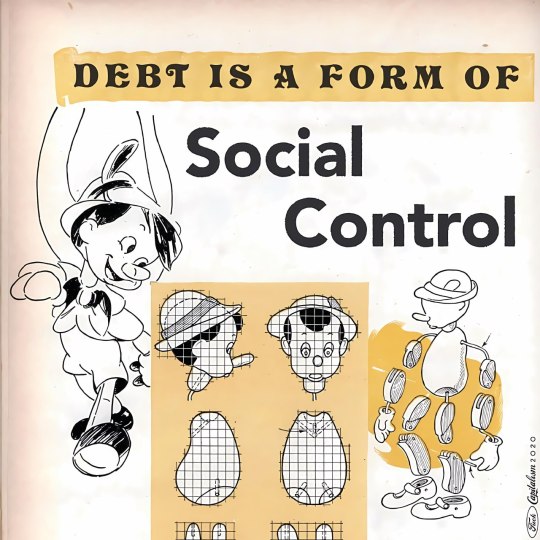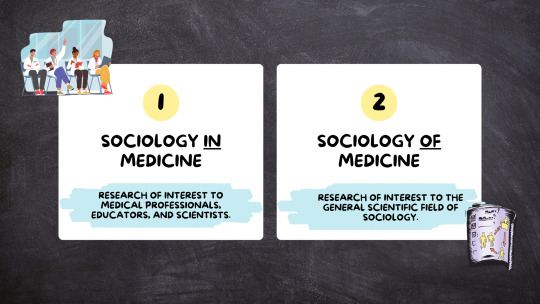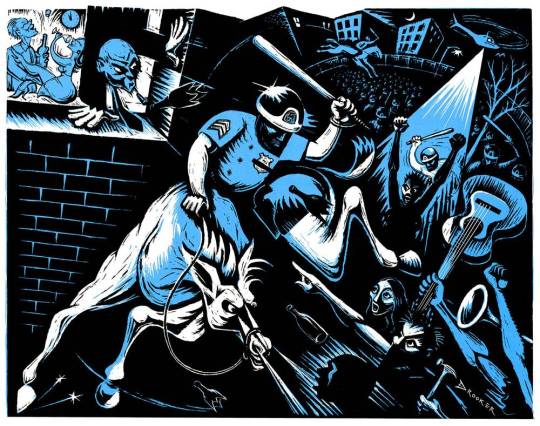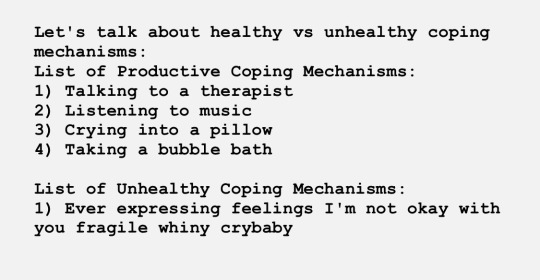#social control
Text

back by popular demand
Society of the Spectacle (Donald Nicholson-Smith Translation) : Guy Debord : Free Download, Borrow, and Streaming : Internet Archive
#society of the spectacle#situationism#situationist international#guy debord#society#social control#control
37 notes
·
View notes
Text
The older I get, the more I feel the pressure of social norms: to get married, buy a car and a house, have children, and trade jokes for a boring serious demeanor. Sometimes I wonder if "Serious Relationship" on Tinder means: I'm looking for a boring person who follows social norms like a sheep.
16 notes
·
View notes
Text
"Elites of both parties have a deeply vested interest in preventing mobility for working people. Homeownership and childbirth are prioritized because both serve big business. None of it is about supporting a cultural desire for family. It’s about keeping people in debt and maintaining an economic status quo. Once you’ve bought a house, once you have kids, once you have student debt, your options to leave your job, start a business, move, or become free are limited. That’s why the government will tell you — or even force you — to have a child but won’t help with childcare.
They don’t want you to be able to work from home. They don’t want you to be free from the yoke of employer-based healthcare (which is hardly a handout as policies are becoming increasingly unaffordable). No. They want you in the office, with less free time than anyone in the free world. Because when people have time to think, to innovate, to start a business of their own without fear that they’ll get sick and go bankrupt from medical bills, they are no longer under corporate control. Without the threat of student debt and medical debt, how could they get you to join the military and fight in their wars? As Sparky Abraham of the Debt Collective puts it: 'Debt is a form of social control.'
Sound conspiratorial? Look at the evidence. Liberal lion Malcolm Gladwell, who has waxed poetic about how he loves to write his bestselling books from cafes, lectured normal folks to get back to work. 'What have you reduced your life to?' he asked the commuting masses. Democrats bragged about halving child poverty with the child tax credits, but despite being overwhelmingly popular, these policies quickly went back on the chopping block. We can’t let parents have enough money so that one can stay at home, or work one fewer job. The market demands a desperate labor force, not a happy one.
Recently, Ken Klippenstein and Jon Schwarz at the Intercept broke news that on an earnings call, the president of Douglas Emmett Inc., a real estate corporation worth over $3 billion and based in Santa Monica, California, said a recession could be 'good' 'if it comes with a level of unemployment that puts employers back in the driver seat and allows them to get all their employees back into the office.'
A recession could be good? Employers back in the driver’s seat? That’s code for 'able to exploit their employees without their employees having any recourse.'
That’s the whole game. The reason so many elites hated the stimulus checks is not because they drove inflation. You see, they don’t tie the PPP checks for billionaires to inflation in the same way. Or Trump’s tax cuts for the rich, which added more to the deficit for absolutely no reason than anything that’s happened before or sense. And they aren’t talking about the supply chain crisis or the war in Ukraine, two key causes of inflation.
No, they talk about spending because they don’t want working people to have options.
When working people have options, they can demand higher salaries. When workers have options, they can bargain for a bigger piece of a pie. This is why union organizing is so important. It gives workers, who individually have very little power, the power of collective bargaining, the power to withhold their labor together and force employers to share profits more equitably. In the golden age of labor, the 1950s and ‘60s, CEOs earned about 30 times more than their employees. Wanna guess what that ratio is now? It’s over 300 to 1. And this is while workers are working more hours with less to show for it.
COVID relief unexpectedly empowered labor, and now elites are trying to put a lid on it in whatever way they can: restarting student loan payments, canceling support for families with children, and intentionally driving up unemployment.
We need to recognize this and use [the recent] student debt victory to continue to pull together as a community of working people and keep demanding more. In the richest country in the history of the world, education should be free. Yes, even for rich kids. Just like public high school is free for the rich should they choose to attend. Just like libraries. And the services of firefighters.
It’s our country, and we get to make it work for us."
- Briahna Joy Gray, from "Debt is a Form of Social Control." Current Affairs, 15 September 2022.
#eat the rich#briahna joy gray#quote#quotations#economics#democratic socialism#working class#labor#labor unions#upward mobility#millennials#gen z#student debt#abortion#bodily autonomy#reproductive rights#debt#social control#student loans#capitalism#american culture#american politics
138 notes
·
View notes
Text

"Debt is a form of social control" (EN: English)
#Debt is a form of social control#debt collection agency#debt collection services#debt recovery#debt#social control#fascism#capitalism#oppression#repression#class war#ausgov#politas#auspol#tasgov#taspol#australia#fuck neoliberals#neoliberal capitalism#anthony albanese#albanese government#eat the rich#eat the fucking rich#oppressor#free all oppressed peoples#pedagogy of the oppressed#oppressive#anti capitalist#capitalist hell#pinnochio
5 notes
·
View notes
Text
"Looking professional" is just another way of saying "looking assimilated and subservient."
92 notes
·
View notes
Text
Compliance, per the two main approaches to medical sociology

Sociology in medicine is research that’s of interest to medical professionals, medical educators, medical scientists— things that are important to medicine as an institution.
Sociology of medicine tends to be research of interest to the general scientific field of sociology, not only sociologists who study matters of medicine, health, illness, healthcare, and disability. Importantly, it is not that medicine is simply disinterested in sociology of medicine, the institution of medicine sometimes has a vested interest in silencing or arguing against sociology of medicine. Sociology of medicine may not be useful to medical professionals, but if, for example, sociology of medicine is critiquing medical practice, as is often the case, it might move beyond useless to being perceived as offensive.
To further explore the difference between sociology in versus of medicine, let’s take the issue of compliance.

From the medical perspective, patient compliance is vital for successful medical practice and treatment. if your patient is not listening to you–for example, if they’re not taking their medication, and that medication is supposed to get them better, than you are going to have a much more difficult time treating that patient, and thus, a much harder time doing your job, than if the patient “complied” with your treatment plan. Same thing if your patient won’t have surgery. Well, if operating is the way that you do your job and the patient refuses, you cannot do your job as well. So, sociology in medicine would examine compliance with this medical perspective in mind. Sociology in medicine might investigate the barriers to patient compliance, and they might ask about these barriers in terms of patient behavior, asking something like "why are these patients non-compliant?" with the goal of identifying things that can be addressed to help patients better comply, so that medical professionals can have better chances of success when trying to do their jobs.
Now, moving to sociology of medicine—the greater field of sociology is interested in issues of power and inequality. When examining compliance in terms of power and inequality, we might look at something like physician control over patients, which would contribute to areas of sociology beyond medical sociology, such as the larger sociological literature on deviance and social control.
From this perspective, physicians offer something that patients cannot obtain on their own—prescription medications, surgery, imaging…these are all things that are considered both illegal and dangerous when obtained from non-credentialed entities. This means patients must be compliant to avoid severe consequences, like physical injury, disability, or even death. Healthcare providers hold power to help people feel better when they have few, if any, safe alternatives.
Instead of looking at compliance as inherently positive or necessary, we can critique the concept, and most importantly, the continued endorsement of compliance as “positive” and “necessary” by credentialed actors in medicine. So, sociology of medicine, similarly to sociology in medicine, may examine barriers to compliance, but because it does not assume compliance is necessary or helpful to the patient, it leaves room to explore the patient experience. Sociology of medicine can explore things like mistrust of medical professionals, experiences with bias and discrimination in the clinical encounter, and the patient’s understanding of a potential treatment as helpful versus their belief that the treatment is useless (independent of the science on said treatment’s effectiveness).
So, while sociology in medicine and sociology of medicine might both be interested in the question of “why do patients become noncompliant,” sociology in medicine might approach that question with the intent of identifying something that will lead to increased compliance, whereas sociology of medicine may approach the question in terms of medical harm, so not taking the assumption that compliance is positive, instead, taking the more skeptical view that compliance might be an exercise of power on the part of the healthcare provider over the patient and focusing on issues like the potential for patterns of exploitation and/or harm of certain groups of patients with shared characteristics. Sociology of medicine might ask whether healthcare providers, because they are powerful, are inherently good or right. Sociology in medicine would probably not ask this question at all, instead assuming the answer to be "yes"
youtube
#sociology#studyblr#phdblr#social science#medblr#health science#research#paradigm#medical sociology#sociology of medicine#sociology in medicine#compliance#power#inequality#deviance#social control#medical sociology 101#Youtube
3 notes
·
View notes
Text
“We were keeping our eye on 1984. When the year came and the prophecy didn't, thoughtful Americans sang softly in praise of themselves. The roots of liberal democracy had held. Wherever else the terror had happened, we, at least, had not been visited by Orwellian nightmares. But we had forgotten that alongside Orwell's dark vision, there was another - slightly older, slightly less well known, equally chilling: Aldous Huxley's Brave New World.
Contrary to common belief even among the educated, Huxley and Orwell did not prophesy the same thing. Orwell warns that we will be overcome by an externally imposed oppression. But in Huxley's vision, no Big Brother is required to deprive people of their autonomy, maturity and history. As he saw it, people will come to love their oppression, to adore the technologies that undo their capacities to think.
What Orwell feared were those who would ban books. What Huxley feared was that there would be no reason to ban a book, for there would be no one who wanted to read one. Orwell feared those who would deprive us of information. Huxley feared those who would give us so much that we would be reduced to passivity and egoism. Orwell feared that the truth would be concealed from us. Huxley feared the truth would be drowned in a sea of irrelevance. Orwell feared we would become a captive culture. Huxley feared we would become a trivial culture, preoccupied with some equivalent of the feelies, the orgy porgy, and the centrifugal bumblepuppy. As Huxley remarked in Brave New World Revisited, the civil libertarians and rationalists who are ever on the alert to oppose tyranny "failed to take into account man's almost infinite appetite for distractions." In 1984, Orwell added, people are controlled by inflicting pain. In Brave New World, they are controlled by inflicting pleasure. In short, Orwell feared that what we fear will ruin us. Huxley feared that what we desire will ruin us."
- Neil Postman, Amusing Ourselves to Death: Public Discourse in the Age of Show Business (1985)
#neil postman#amusing ourselves to death#1984#brave new world#dystopia#visions of future horror#social control#public discourse#capitalist press#george orwell#aldous huxley
57 notes
·
View notes
Link
There's no cure for stupid
#Canada#masking#fraud#pseudoscience#COVID#politics#polling#harms#irrationality#fearmongering#social control#compliance
5 notes
·
View notes
Text

"My neighborhood was a place of unrest. I lived right down the block from Tompkins Square Park, where the police attempted to enforce a midnight curfew, in 1988. The park sits in the heart of Lower East Side, a volatile neighborhood with a long, radical history of resistance. So, when a police megaphone ordered everyone out of the park one hot summer night, we all refused to leave. The crowd just stood there, chanting: "Whose fucking park? OUR fucking park!" Then without warning, riot police charged into the crowd on horseback. Screaming and chaos ensued. People reacted by throwing bottles, bricks, and firecrackers at the cops. I took it all personally. This was the park I'd grown up in... my playground as a child. I'd never seen this level of violence firsthand - I saw the police just cracking people's skulls open and galloping into the crowd - helicopters hovering above tenements - an unforgettable, apocalyptic scene. I saw my friends and neighbors fighting against the helmeted police - rebelling against the landlords... and it was inspiring as hell. Oh, it was picturesque indeed: nocturnal hordes of uniformed men on horseback, swinging shiny batons. I immediately began working on my next street poster, 'Police Riot', which was wheat-pasted on lampposts and walls throughout the neighborhood. Later I used this image in Flood!'s riot sequence. Ultimately, the band Rage Against the Machine used it as a CD cover."
Eric Drooker
{pictured: Police Riot, by Eric Drooker}
#eric drooker#art print#poster art#tompkins square park#police riot#police brutality#social control#Flood!#rage against the machine#rebellion#resistance
2 notes
·
View notes
Text
So social media is designed to induce learned helplessness, right? Like you get inundated with problems you can't do anything about, and fears you can't do anything to avoid, and it erodes your stability until you're emotionally exhausted. It turns everyone into a starving, beaten dog who only knows how to growl and bark and bite. It's a tool for mind control, and it's definitely not accidental. It's a black hole designed to trap and eliminate revolutionary fervor.
#social media#twitter#facebook#social control#mk ultra#“mind control” doesn't really work#the only way to make people behave the way you want is indirectly#and only if they think it's voluntary
2 notes
·
View notes
Text

Anyone else ever notice this? People be like “express your feelings! Oh but not those feelings”
8 notes
·
View notes
Text

Excessive positivity also expresses itself as an excess of stimuli, information, and impulses. It radically changes the structure and economy of attention. Perception becomes fragmented and scattered. Moreover, the mounting burden of work makes it necessary to adopt particular dispositions toward time and attention [Zeitund Aufmerksamkeitstechnik]; this in turn affects the structure of attention and cognition. The attitude toward time and environment known as “multitasking” does not represent civilizational progress. Human beings in the late-modern society of work and information are not the only ones capable of multitasking. Rather, such an aptitude amounts to regression. Multitasking is commonplace among wild animals. It is an attentive technique indispensable for survival in the wilderness.
Byung Chul Han The Burnout Society ( 2015, Stanford Briefs) Libgen.lc : Free Download, Borrow, and Streaming : Internet Archive
18 notes
·
View notes
Text
People need stories and art, that's an immutable truth. They'll make it if they're not being given it; sometimes they make it because they need to anyway.
Capitalism sees that this need can be monetised; government sees that this need can be harnassed to push whatever agenda benefits the ruling class. So they'll allow it, even promote it.
Some people need to make art so badly they'll do it for free; artists and writers are being paid an absolute pittance, mostly, so making AI do art to cut costs seems illogical to me. Like many people argue, that solves a nonexistent problem.
The problem it does solve is that artists and writers are a transgressive bunch. The fact that they're making so much art and telling so many stories, for free, that the AI can be fed with them at no cost to the producers, tells you they're not being motivated by money to nearly the same extent as a lot of non-artists. Of course creatives want money too. But when given the choice of a comfortable living merely as a consumer of art, or a subsistence level living as a creator of art? If they have any choice at all (and goodness knows, so many have no choice but subsistence even when employed) some artists will still forego the creature comforts of capitalism. Those are often the people obsessed enough to stick with it for decades (that doesn't make them better humans, they just need art more than they need a comfortable living in corporate capitalism).
And those people are often very critical of the ruling class and capitalism.
Now most people need art and stories not because they want to be critical of the ruling elite or capitalism, but first and foremost because they need entertainment.
So what if you could entertain and influence public opinion without a whiff of criticism? What if you could make yet more money without even unwittingly feeding dissent? What if you could force even more people out of making any art at all, even for a pittance - knowing full well that these people are your biggest threats, not the ones who have relatives they could conceivably lean on while not being paid?
No, I mean the poor, marginalised, deeply angry, transgressive?
What if we could silence them while feeding most of us entertaining content produced for near nothing?
Wouldn't that be a good way to keep the powerful in power?
3 notes
·
View notes
Quote
Rarely is history notable for its capacity to select and preserve the most virtuous traits of humanity.
Murray Bookchin (author, The Ecology of Freedom: The Emergence and Dissolution of Hierarchy)
#philosophy#history#bookchin#qualitative rationality#democratic socialism#community#social ecology#murray bookchin#ecology of freedom#dissolution of hierarchy#social control#technology and civilization#political science#humanity#virtue
2 notes
·
View notes
Text
#a short and recent history#the beauty industry is ugly#beauty standards#you have been sold a lie#hypocrisy#body hair#this is not a hygiene issue#social control#normative and performative#reclaim your self#it's a body we all have one#hair removal#Western Centric#kill white culture#capitalism is killing us
3 notes
·
View notes
